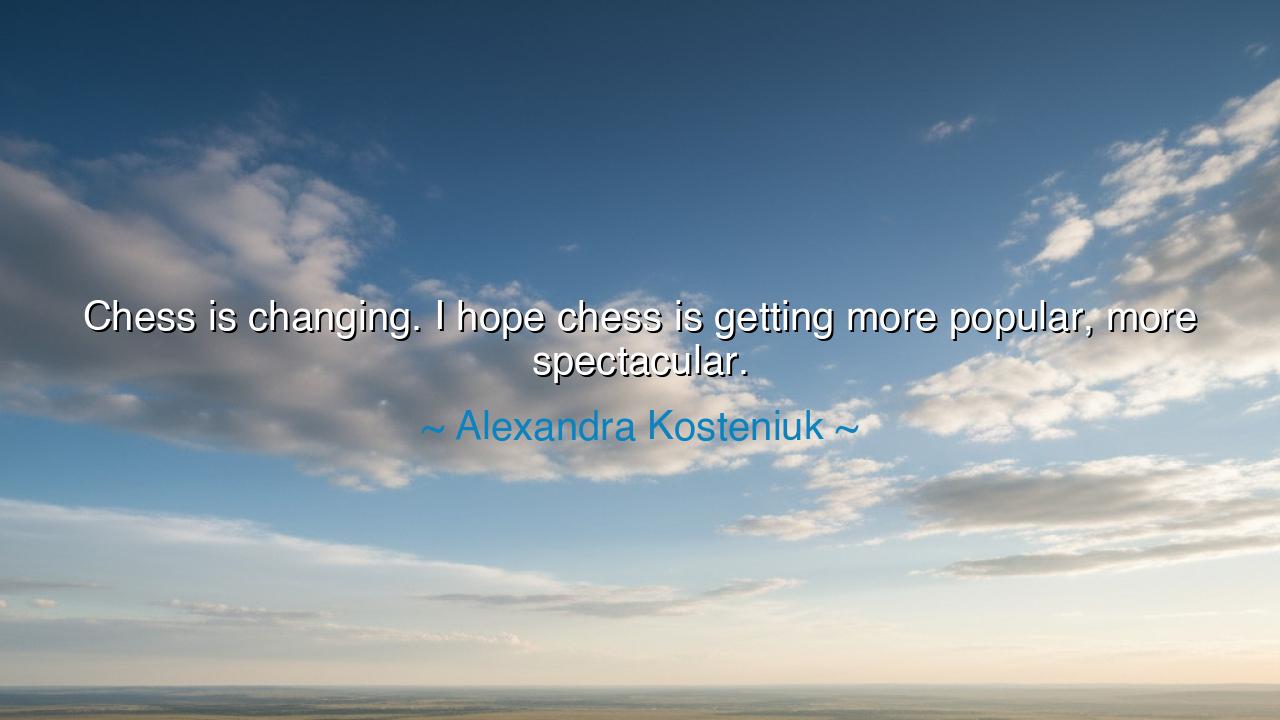
Chess is changing. I hope chess is getting more popular, more






The words of Alexandra Kosteniuk — “Chess is changing. I hope chess is getting more popular, more spectacular.” — resound like the voice of a guardian standing at the threshold between two ages. In her words, there is both reverence for tradition and a courageous hope for transformation. She speaks not merely of a game, but of a living art, one that reflects the evolution of the human mind itself. For chess, though born in the mists of antiquity, continues to grow and breathe, reshaping itself in every generation. Kosteniuk, a world champion, a scholar, and a symbol of intellect and grace, stands as a bridge between the ancient order and the new — between the solemn silence of the tournament hall and the dazzling light of a digital world that now carries the spirit of the game to every corner of the earth.
To understand her words, one must know the history from which they rise. Chess was born thousands of years ago in the East — as chaturanga in India, and later as shatranj in Persia — before spreading across the world to become a universal language of strategy and thought. Through the centuries, it has been both a battlefield and a poem, a meditation and a duel of minds. It has enthralled kings and commoners alike, from the courts of medieval Europe to the cafés of Paris and Moscow. Yet, for much of its history, chess was a quiet pursuit, revered but secluded — a realm for scholars, ascetics, and dreamers. When Kosteniuk says, “Chess is changing,” she is bearing witness to a new era: one where this ancient art is awakening again, stepping into the light of the modern age, becoming accessible, dynamic, and yes — spectacular.
Her words are both prophecy and blessing. In our time, chess has broken the walls that once confined it. With the rise of technology, tournaments are streamed across continents, commentary fills the air like the hum of an amphitheater, and masters of the game are known to millions. The once-silent board is now a theater of intellect, where tension, creativity, and courage play out before the eyes of the world. Yet Kosteniuk’s hope goes beyond mere fame — she wishes for a deeper transformation, where chess becomes not only popular but inspiring. She envisions a world where the game ignites imagination, teaches patience, and brings people together — where it ceases to be only a contest of calculation and becomes a celebration of the human spirit’s capacity for thought and beauty.
History offers examples of how such transformation can uplift even the oldest of arts. Consider Alexander the Great, who, though born a warrior, learned from Aristotle the importance of philosophy and culture. He took the art of conquest and made it a tool of enlightenment, spreading learning across empires. So too, Kosteniuk seeks to elevate chess beyond competition, to make it a vessel for wisdom and unity. Like Alexander, she understands that when the old disciplines meet new worlds, they can become something greater — a bridge between eras, a symbol of continuity amid change. Her words remind us that tradition is not a prison, but a foundation upon which the new can rise.
When Kosteniuk speaks of making chess spectacular, she does not mean to dilute its depth, but to reveal its hidden drama to those who have never seen it. Every move in chess is a story — of ambition, sacrifice, deception, and redemption. The ancients would have called it a microcosm of life itself. To bring that to light — to show that the clash of queens and knights is as thrilling as any battle, as poetic as any verse — is to invite humanity once more into dialogue with the eternal. The spectacle, then, is not mere showmanship, but revelation: the unveiling of beauty that has always been there, waiting for eyes to see.
There is, too, a profound humility in her words. “I hope chess is getting more popular,” she says — not “I have made it so,” but “I hope.” It is the humility of the true master, who knows that she serves something greater than herself. Like the philosophers of old, who did not claim to own wisdom but to love it, Kosteniuk serves the game as a disciple, not a ruler. Her hope reflects her understanding that no art endures without renewal, and no renewal succeeds without love. To wish for the growth of chess is to wish for the flourishing of the mind — for a world that values thought over noise, reason over rage, contemplation over chaos.
The lesson that flows from her words is one of balance between reverence and reinvention. Whatever your craft — be it science, art, music, or thought — do not cling to it so tightly that it withers in your grasp. Let it evolve. Let it breathe. Yet, in changing it, honor its soul. For the future must grow from the roots of the past, not from the ashes of its destruction. This is how all great things endure: by transforming without betraying themselves.
So, remember the wisdom of Alexandra Kosteniuk: “Chess is changing. I hope chess is getting more popular, more spectacular.” Whether your battlefield is a chessboard, a canvas, or the world itself, let your work change with the times — but let its spirit remain timeless. Seek not only mastery, but meaning. Seek not only progress, but beauty. For it is only when the old and the new walk hand in hand that the human story, like the game of chess itself, continues — infinite, evolving, and eternally alive.






AAdministratorAdministrator
Welcome, honored guests. Please leave a comment, we will respond soon